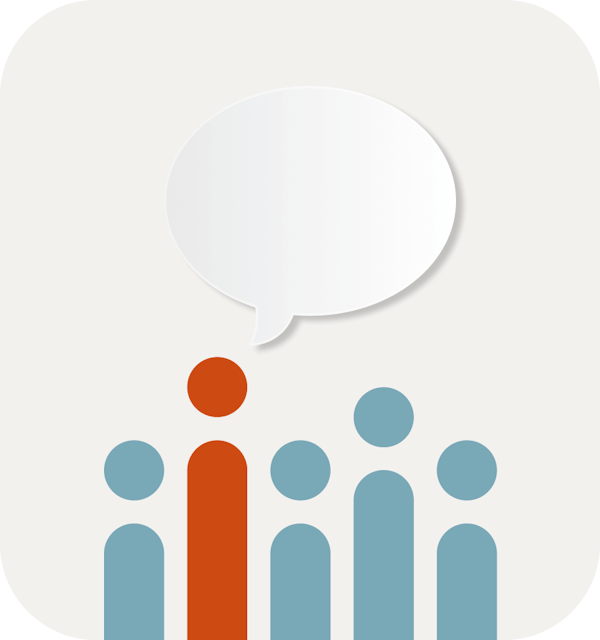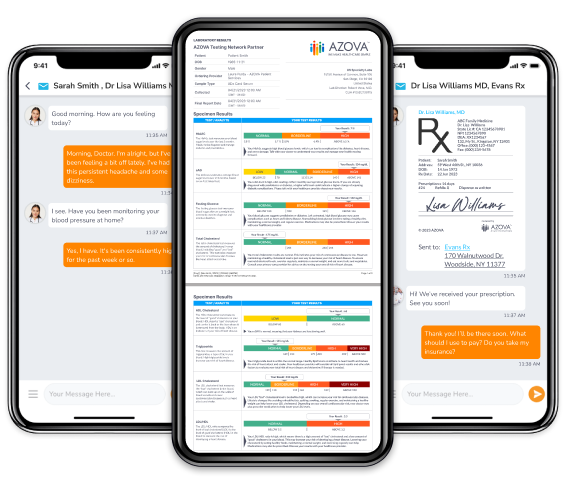Personalized anxiety disorders treatment, just a click away.
Connect with an expert mental health professional through a secure, confidential video visit or messaging. Get a diagnosis and tailored treatment plan, all without leaving home.
Therapy services are available for adults and children of all ages in all 50 states. Psychiatry services are available for adults 18+ in all 50 states and for children 12+ in location where available.

Understanding anxiety disorders1
Anxiety disorders are prevalent mental health conditions affecting nearly 30% of adults. While mild anxiety can be beneficial, excessive and persistent fear or worry can significantly disrupt daily life.
Unlike fear, which is a response to immediate threats, anxiety is focused on future concerns. This excessive worry can activate the body’s “fight-or-flight” response, even in the absence of immediate danger.
Types of anxiety disorders1
To be diagnosed with an anxiety disorder, the fear or anxiety must be disproportionate to the situation, inappropriate for the individual’s age, and interfere with daily functioning. The types of anxiety disorders are:
- Generalized anxiety disorder
- Panic disorder with or without agoraphobia
- Specific phobias
- Agoraphobia
- Social anxiety disorder
- Separation anxiety disorder
- Selective mutism
- Anxiety symptoms in adults
- Anxiety symptoms in children
- Anxiety causes in adults
- Anxiety causes in children
- Anxiety treatments for adults
- Anxiety treatments for children
Anxiety symptoms in adults2
Anxiety disorders can occur simultaneously, affecting individuals at various stages of life. Symptoms often emerge during childhood or adolescence and persist into adulthood. Women are more likely to be diagnosed with anxiety disorders compared to men.
Anxiety disorders can manifest in various ways, often involving excessive fear or worry. Common symptoms include:
- Excessive fear or worry: Individuals with anxiety disorders often experience excessive fear or worry about specific situations or a more generalized sense of unease.
- Avoidance: To cope with anxiety, individuals may avoid situations that trigger their symptoms.
- Physical symptoms: Anxiety disorders can lead to a range of physical symptoms, including difficulty concentrating, irritability, restlessness, digestive problems, heart palpitations, sweating, trembling, sleep disturbances, and a sense of impending danger or doom.
It’s important to note that anxiety disorders can significantly increase the risk of depression, substance abuse, and suicidal thoughts and behaviors.
Anxiety symptoms in children3
It’s common for children and young people to experience occasional anxiety, especially during significant life transitions. However, when anxiety becomes a daily struggle, affecting their thoughts, behaviors, and overall well-being, professional help may be necessary.
Here are some common signs of anxiety in children and young people:
- Difficulty concentrating
- Sleep disturbances, including nightmares
- Changes in appetite
- Increased irritability or anger outbursts
- Constant worrying or negative thoughts
- Physical symptoms like tension, fidgeting, or frequent bathroom use
- Excessive crying
- Clinginess, particularly in younger children
- Physical complaints like stomachaches or feeling unwell
It’s important to note that separation anxiety is common in younger children, while older children and teenagers may exhibit more school-related or social anxiety.
Anxiety causes in adults1
Anxiety is a multifaceted condition, influenced by a complex interplay of factors. While the exact causes remain a subject of ongoing research, experts believe that a combination of biological, psychological, and environmental elements contribute to its development. Potential causes of anxiety include:
- Genetic predisposition: Family history of anxiety disorders, particularly among first-degree relatives, can significantly increase the risk.
- Neurobiological factors: Dysfunctions in brain regions responsible for fear processing and memory formation may play a role.
- Psychological factors: Stressful life events, negative experiences, and personality traits like shyness or nervousness can contribute to anxiety development.
- Environmental factors: Exposure to trauma, abuse, or other adverse circumstances can increase vulnerability.
- Medical conditions: Underlying health issues, such as depression, diabetes, or thyroid problems, can exacerbate anxiety symptoms.
- Substance use: Consumption of certain substances, including caffeine, can trigger or worsen anxiety.
Anxiety causes in children1
Anxiety is a common concern among children, and there are several factors that can contribute to its development. Genetics play a role, as children of anxious parents are more likely to experience anxiety themselves. Children may experience anxiety following traumatic events, including:
- Frequent moves or changes in schools
- Parental conflict or arguments
- The loss of a loved one
- Serious illness or injury
- School-related stressors like exams or bullying
- Abuse or neglect
Anxiety treatments for adults2
Anxiety disorders are treatable. If you’re experiencing symptoms, seek professional care.
- Psychological interventions
Talk therapy is crucial for treating anxiety. It helps develop coping strategies and face anxiety-inducing situations.
- Stress management and medication
Stress management techniques, such as relaxation and mindfulness, can reduce anxiety symptoms. Antidepressants like SSRIs can be useful for adults, but providers must consider side effects and personal preferences. Benzodiazepines are generally avoided, due to addiction risks and limited long-term effectiveness.
- Complement professional treatment with self-care
Limiting alcohol and drug use, exercising regularly, maintaining consistent eating and sleeping habits, and practicing relaxation techniques and mindfulness meditation can go a long way.
For a private and confidential approach to managing anxiety, consider starting with an AZOVA Behavioral Health appointment. Connect with an experienced provider online to discuss your concerns and explore tailored treatment options.
Anxiety treatments for children4
Anxiety disorders in children are often chronic without proper treatment, typically requiring professional help.
- Cognitive-behavioral therapy (CBT): CBT is a proven talk therapy that helps children manage anxiety by replacing negative thinking with positive patterns and providing practical techniques for daily use. Sessions usually last around 12 weeks, offering long-term benefits. The therapist will also guide you on supporting your child’s progress at home and school.
- Medication: Medications, especially selective serotonin reuptake inhibitors (SSRIs), can be effective, often used with therapy. Medication may be used short-term or long-term, based on symptom severity and response.
AZOVA’s Behavioral Health services for anxiety disorders in children are also available for convenient and confidential support. This option provides quick access to expert care without the need for travel, helping manage symptoms efficiently.
Don’t suffer through an anxiety disorder. Get treatment today.
References
1American Psychiatric Association. (2023, June). What are anxiety disorders? (Physician review by Philip R. Muskin, M.D., M.A.). Retrieved from https://www.psychiatry.org/patients-families/anxiety-disorders/what-are-anxiety-disorders
2World Health Organization. (2023, September 27). Anxiety disorders. Retrieved from https://www.who.int/news-room/fact-sheets/detail/anxiety-disorders
3National Health Service. (2023, December 15). Anxiety disorders in children. Retrieved from https://www.nhs.uk/mental-health/children-and-young-adults/advice-for-parents/anxiety-disorders-in-children/
4American Association for Depression and Anxiety (ADAA). (n.d.). Retrieved from https://adaa.org/living-with-anxiety/children/treatment
5Holland, K. (2023, January 2). Everything you need to know about anxiety. Healthline. Medically reviewed by Jacquelyn Johnson, PsyD. Retrieved from https://www.healthline.com/health/anxiety
Need help or have questions?
Contact our AZOVA Customer Support team below
Live 24/7 chat
(quickest response)
You can chat with AZOVA’s Customer Support team for comprehensive support, including help with your account, testing, shipping, and results.
We typically respond within 5 minutes. Click the messaging icon on the lower right corner of the page to get started.



